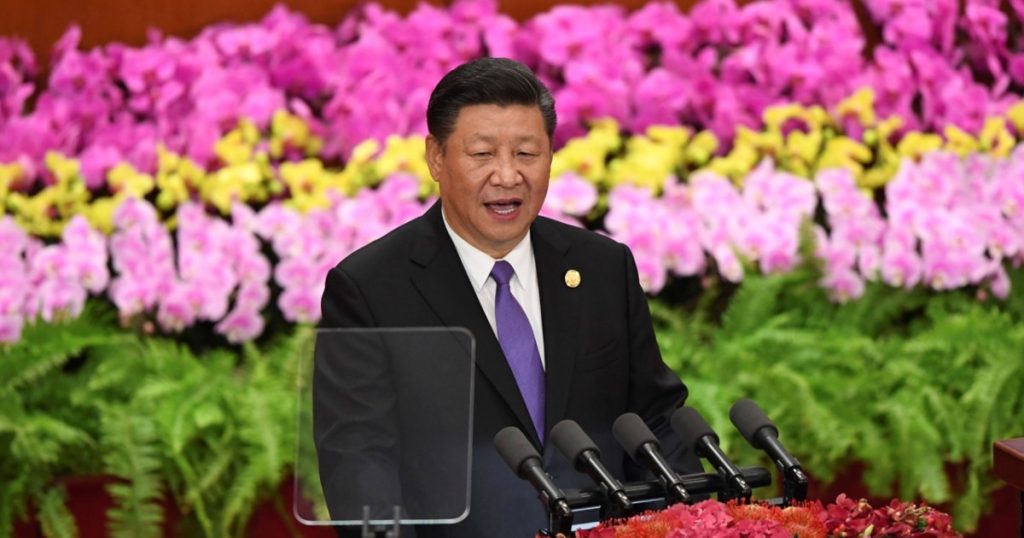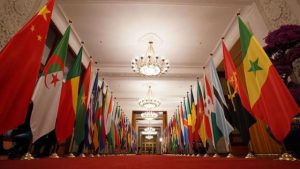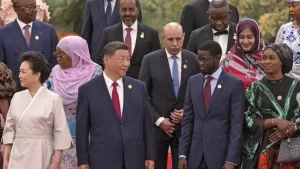
China’s influence across Africa remains formidable as it continues to play a significant role on the continent. While other international actors such as France and Russia face increasing skepticism, China maintains a nuanced and adaptable approach. This was evident during the recent Forum on China-Africa Cooperation (Focac) summit in Beijing, where delegations from over 50 African nations gathered, demonstrating the enduring importance of Sino-African relations.
The summit, which saw participation from numerous African leaders and UN Secretary-General António Guterres, was a pivotal moment. Notably, new Senegalese President Bassirou Diomaye Faye made his debut at the event, receiving a prominent position alongside President Xi Jinping in the official leaders’ photograph. This gathering underscored China’s unique ability to engage with a diverse range of African governments, regardless of their political alignments or international affiliations.
In contrast to other global powers, China offers a stable partnership without the political conditions often associated with Western aid or the contentious nature of Russian security deals. For African nations seeking to navigate a polarized international landscape, China’s consistent engagement, free from political strings, is increasingly valued.

China’s strategy in Africa is driven by a pursuit of economic interests, particularly in securing natural resources essential for its development. This includes significant investments in infrastructure, such as roads, railways, and pipelines. However, China’s approach has faced criticism for inducing substantial debt among African nations and being slow to address the burden of repayment. Although China has resisted outright debt cancellations, it has provided development support in the form of infrastructure projects.
The recent summit marked a shift in China’s focus, with a pronounced emphasis on green energy and sustainable development. This includes investments in manufacturing sectors such as electric vehicles, a notable departure from the traditional focus on large-scale infrastructure. This shift is both symbolic and practical, signaling China’s commitment to supporting Africa’s transition to greener technologies and industries.
China also announced plans to invest in 30 clean energy projects and explore cooperation in the nuclear sector. This latter commitment is particularly striking given the historical context; France has long mined Niger’s uranium for its own energy needs without similar investments in West Africa’s energy infrastructure. China’s increased involvement in Nigerien uranium mining and its proposed support for nuclear projects could address long-standing grievances among African commentators.

Despite these promising announcements, there remain unresolved issues. Environmental concerns persist, such as accusations of Chinese over-fishing practices harming local fisheries. The summit’s discussions avoided these contentious topics, focusing instead on constructive outcomes like the Beijing Declaration and the Beijing Action Plan for 2025-2027. President Xi Jinping’s commitment to tripling infrastructure projects and creating one million jobs highlights China’s intent to deepen its engagement in Africa.
The financial details of the new funding are still emerging. The promised 360 billion yuan ($50.7 billion) includes credit lines, business investments, and a smaller allocation for military and food aid. The challenge will be to ensure that this financing does not lead to unsustainable debt levels, as seen in the past. Critics argue that Chinese lending has contributed to debt crises in several African countries, though supporters contend that China has stepped in where other international partners have been unwilling to invest.
As global economic pressures and the aftermath of the pandemic impact many countries, the G20’s Common Framework aims to stabilize debt burdens. China has participated in these efforts but has faced criticism for its limited contributions. The latest Focac summit suggests a potential shift in China’s role, moving from traditional infrastructure projects to broader economic and technological partnerships.
The future of China-Africa relations remains to be seen. While the focus on green technology and hi-tech industries represents a significant shift, it remains uncertain whether this will transform the relationship fundamentally or if the emphasis on large infrastructure projects will continue. As China adapts its strategy, the evolving dynamics between Beijing and African nations will shape the continent’s development trajectory in the coming years.







